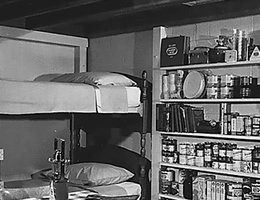
Did farm homes in Nebraska need fallout shelters, even if they were located far away from the supposed targets of nuclear bombs?

"Shelters make good sense," declared Mrs. Lorraine Still, Custer County home agent, "even though farm families may live hundreds of miles from military targets or large population centers." In 1962, a Nebraska Farmer magazine article quoted Mrs. Still’s arguments for rural fallout shelters:
"Most farms already have shelters in the form of storm caves and potato cellars. It’s just another step to prepare them for protection against radioactive fallout. Many of these are already being cleaned up and stocked with food according to civil defense recommendations. Little effort and expense are required to make almost any home offer some degree of fallout protection."
Fallout comes when a fireball from a nuclear weapon touches the earth’s surface and great clouds of pulverized debris are sucked miles up into the atmosphere. These tiny particles are mixed with the particles from the weapon itself and are very radioactive. They may rise to a height of more than 16 miles above the earth. Eventually wind and gravity will bring snow-like radiation-bearing debris back to earth. The debris is known as fallout. It may be so fine that you can’t see it, but fallout can be deadly.
The best all-around protection officials said, was an underground shelter with at least three feet of earth or sand covering it. Two feet of concrete would give the same protection. Adding an adequate door plus an air filter cut the danger from fallout "almost down to zero." Radiation measuring devices could be added to the shelter. They sold for about $20 and had been tested and approved by the civil defense authorities.
Harry Purcell, the Custer County civil defense chairman, said that Soviet atmospheric testing of atomic warheads and the tense Berlin situation did a lot to make people think about fallout and the need for shelters.
"It’s shaking people out of their lethargy. Farmers seem more interested than others do. As a rule, they are farther from help in case of emergency. Rural people also have the space to make some sort of shelter, an item which many townspeople lack."
Central Nebraska, was in between the SAC and missile bases in the east and the missile bases in the west, but the people there were still worried about being on the fringe of the radiation and fallout zones. The protection measures suggested for eastern Nebraska farmers living near a major military target such as Offutt Air Force Base were more elaborate.
Also, missiles had been known to fall far away from their intended targets. If central Nebraska were hit by a missile carrying an atomic warhead, there would be no warning and little could be done to prepare for it. Still, the main concern was preparing for fallout brought in by prevailing winds from atomic attacks on military targets in Wyoming, Colorado, South Dakota, and eastern and western Nebraska.
In planning for civil defense, officials predicted that most central Nebraska communities would have several hours warning after an attack on these top military targets before fallout would start sifting down in central Nebraska.
At least some Custer County residents took the recommendations to heart. Broken Bow pharmacist Charles Patch built a basement shelter in his house and stocked it with food and water for his wife and four children. All his old magazines were stored in the shelter so they would have reading material. Patch said, "Keeping busy in a shelter for some time would be difficult, especially if there were children to be entertained. Games, songbooks and reading material would all be valuable." Patch believed that "planning to avoid hysteria and panic already has the problem half whipped."
Over the years, the level of fear decreased somewhat, but officials believe that the planning still helped. Violent blizzards or tornadoes were much more likely disasters, and the warnings came with only minutes or seconds to spare. So, the country’s civil defense plans included preparations for natural disasters, too. Mrs. Still said that:
"Protective measures against fallout aren’t much different than preparing for a tornado. Fallout might mean a longer stay in a shelter and that would mean a larger stock of food."